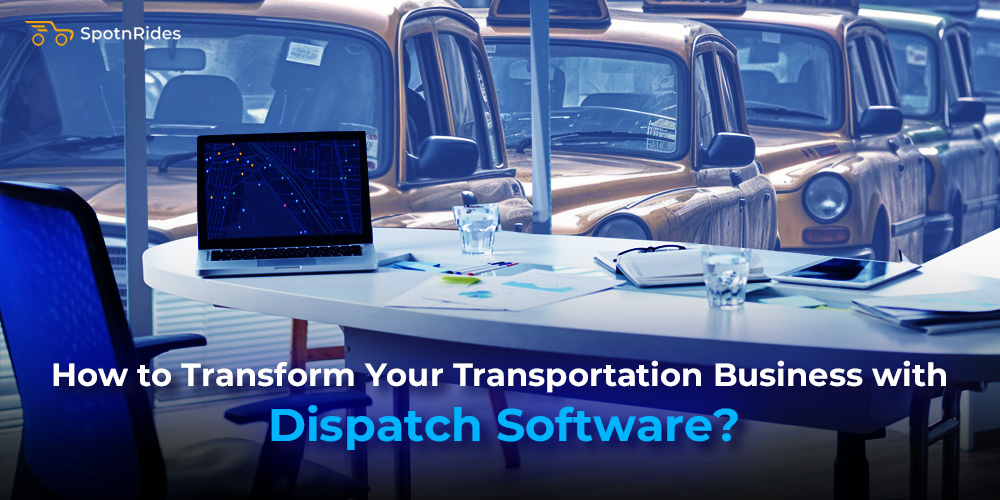
How to Transform Your Transportation Business with Dispatch Software?
In today’s fast-paced world, the transportation industry is more crucial than ever, ensuring the smooth movement of goods and services. The demand for taxi, tow, and truck services is rising due to urbanization, ridesharing, e-commerce, emergencies, economic growth, specialized services, and environmental issues.
These businesses are essential components of modern transportation and logistics, catering to the evolving needs of consumers and industries alike. The need for efficient management and optimization is universal, from logistics companies managing global supply chains to local delivery services, termed dispatch software.
In this article, we’ll explore the significance of the dispatch system and how it transforms transportation management.
Understanding Dispatch Software
At its core, dispatch software is a sophisticated solution designed to streamline transportation operations. It acts as a central hub for managing and coordinating vehicles, drivers, and shipments. Whether you operate a fleet of trucks, a towing service, or a ride-sharing platform, a dispatch system can revolutionize the way you manage your operations.
How does it work?
- The dispatch system begins by collecting and inputting essential data.
- The software organizes and manages available resources based on predefined criteria.
- Dispatch software assigns specific tasks or jobs to available resources.
- It calculates the most efficient paths for resources to reach their destinations.
- Dispatch systems incorporate GPS technology to track the real-time location of dispatched resources.
- The dispatch system facilitates seamless communication between dispatchers and drivers.
- It enhances the efficiency, coordination, and overall performance of businesses and organizations that rely on dispatching operations.
Various Transportations that Need Dispatch Software
The dispatch system is a versatile tool that finds applications across a spectrum of transportation businesses. The following sectors can greatly benefit from this initiative:
Trucking Companies
Trucking companies are the backbone of the logistics industry. Dispatch software helps them optimize routes, reduce fuel costs, and ensure timely deliveries, enhancing overall efficiency.
Tow service
Increasing the use of vehicles can require increased tow services. Towing dispatch software can manage the efficiency of roadside assistance for customers and companies alike. Safety during an emergency situation can be handled with an efficient routing system.
Taxis and Ride-Sharing Services
For taxis and ride-sharing platforms, Taxi Dispatch Software is the backbone of their business. It connects drivers with passengers, optimizes routes, and ensures a seamless ride-hailing experience.
Benefits of Dispatch Software
Now that we’ve explored the various transportation sectors that benefit from the dispatch system, let’s delve into the transformation it offers to the transportation business:
Improved Efficiency
Dispatch software automates many manual tasks, such as route planning and vehicle allocation. This not only saves time but also reduces errors, resulting in smoother operations. Increased time management.
Cost Reduction
Efficient route planning and fuel optimization lead to significant cost savings. Additionally, reduced downtime and maintenance expenses contribute to improved profitability.
Enhanced Customer Service
Real-time tracking and communication tools enable transportation businesses to provide customers with accurate arrival times and updates. This enhances trust and satisfaction.
Real-time Tracking and Reporting
Dispatch software offers real-time visibility into the location and status of vehicles. This information is invaluable for monitoring operations and making data-driven decisions.
Route Optimization
The reduction of vehicle wear and tear and the reduction of fuel consumption are all benefits of route optimization. This is particularly crucial for long-haul trucking companies.
Fleet Management
For businesses with large vehicle fleets, dispatch software provides comprehensive fleet management capabilities, including maintenance scheduling and driver performance tracking.
Communication Tools
Effective communication is the cornerstone of transportation management. Dispatch software offers robust communication features, facilitating coordination between drivers, dispatchers, and customers.
Scalability
As your transportation business grows, dispatch systems can scale with you. It adapts to your changing needs, whether you’re adding more vehicles, expanding routes, or entering new markets.
Implementation and Integration
Implementing a dispatch system requires careful planning and seamless integration with your existing systems. It’s a significant transition that can yield remarkable results if executed correctly. Here’s how to go about it:
Resistance to Change:
Organizations often employ strategies such as involving employees in the decision-making process, providing clear and transparent communication, offering training and support, and showcasing the benefits of the change. Recognizing and addressing the various factors contributing to resistance can lead to smoother transitions and greater acceptance of change initiatives within an organization.
Data Migration:
Data migration is a complex and resource-intensive process that, when executed successfully, allows organizations to leverage new technologies, improve data accessibility, and adapt to changing business needs. However, due to their complexity, data migration projects require careful planning, thorough testing, and a well-defined strategy to minimize risks and ensure the integrity of the data being transferred.
Integrating with Your Current Systems:
Successful integration with your current systems enables your organization to leverage the benefits of new software or technologies while preserving the functionality and data integrity of your existing ecosystem. It’s a strategic approach to improving efficiency, data accuracy, and the overall performance of your organization’s technology infrastructure.
Conclusion
Dispatch software is a transformative tool that empowers transportation businesses to operate with unparalleled efficiency, reduce costs, enhance customer service, and adapt to growth. Develop such software with SpotnRides for your transportation business to handle your business with ease.
Whether you’re managing a fleet of trucks or running a ride-sharing platform, embracing dispatch systems can take your transportation management to the next level. Stay ahead of the competition and meet the demands of today’s fast-paced world with this invaluable technology.
